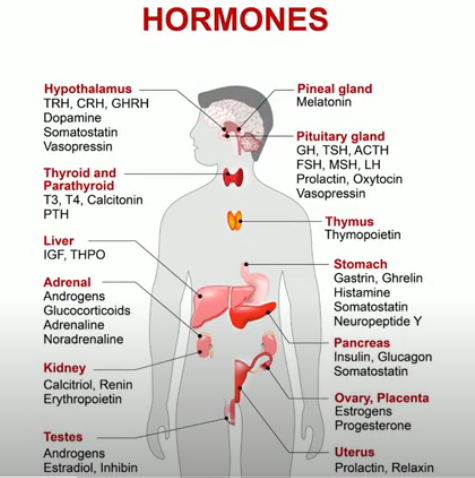- HOLISTIC HEALTHCARE -
Hormones
Hormones are chemical messengers produced by glands in the endocrine system. They travel through the bloodstream to target organs and tissues, where they regulate a variety of physiological processes. Hormones are essential for maintaining homeostasis (balance) within the body and influencing growth, metabolism, reproduction, mood, immune function, and many other bodily functions.
Types of Hormones:
-
Peptide Hormones:
-
Made of amino acids and are water-soluble.
-
Example: Insulin, which regulates blood sugar levels, and growth hormone, which regulates growth and development.
-
-
Steroid Hormones:
-
Made from cholesterol and are fat-soluble.
-
Example: Testosterone, estrogen, and cortisol.
-
-
Amino Acid Derivatives:
-
These are made from individual amino acids.
-
Example: Thyroxine (from the thyroid) and epinephrine (adrenaline).
-
-
Fatty Acid Derivatives:
-
Example: Prostaglandins, which play roles in inflammation and other processes.
-
Major Hormones and Their Functions:
-
Insulin and Glucagon (Pancreas):
-
Insulin lowers blood sugar levels by facilitating the uptake of glucose into cells.
-
Glucagon raises blood sugar levels by promoting the release of glucose from liver stores.
-
-
Thyroid Hormones (Thyroid Gland):
-
Thyroxine (T4) and triiodothyronine (T3) regulate metabolism, energy production, and growth.
-
These hormones are involved in controlling the body’s basal metabolic rate (BMR).
-
-
Cortisol (Adrenal Gland):
-
Often called the "stress hormone," cortisol helps the body respond to stress by increasing glucose production, suppressing the immune system, and managing metabolism.
-
-
Adrenaline (Epinephrine) (Adrenal Gland):
-
Prepares the body for a "fight or flight" response during stressful situations. It increases heart rate, boosts energy production, and dilates airways.
-
-
Sex Hormones (Gonads – Ovaries and Testes):
-
Estrogen and progesterone regulate female reproductive function, menstruation, pregnancy, and secondary sexual characteristics.
-
Testosterone is responsible for male reproductive function, sperm production, and the development of male secondary sexual characteristics (e.g., muscle mass, body hair).
-
-
Growth Hormone (Pituitary Gland):
-
Stimulates growth and cell regeneration.
-
Plays a critical role in childhood development but also affects muscle and bone growth in adults.
-
-
Oxytocin (Pituitary Gland):
-
Often referred to as the "love hormone," oxytocin is involved in childbirth (stimulating contractions) and lactation (milk ejection).
-
It also plays a role in bonding, trust, and emotional connections.
-
-
Melatonin (Pineal Gland):
-
Regulates sleep-wake cycles by promoting sleep and helping the body adjust to circadian rhythms.
-
Hormones are typically regulated through feedback mechanisms, primarily negative feedback loops. In these loops, the body detects changes in hormone levels and adjusts production accordingly to maintain balance. For example, if blood glucose rises, the pancreas releases insulin to lower it, and once it returns to normal levels, insulin production decreases.
An imbalance in hormone production can lead to various health issues, including:
-
Hyperthyroidism (Overproduction of thyroid hormones) – Can lead to weight loss, rapid heartbeat, and anxiety.
-
Hypothyroidism (Underproduction of thyroid hormones) – Can cause fatigue, weight gain, and depression.
-
Diabetes (Issues with insulin production or function) – Can cause issues with blood sugar regulation.
-
Polycystic Ovary Syndrome (PCOS) – Involves hormonal imbalances that affect the menstrual cycle and can lead to infertility.
-
Cushing’s Syndrome (Excess cortisol) – Can cause weight gain, high blood pressure, and skin changes.
Hormones are incredibly diverse in their effects, and even small changes in their levels can have a significant impact on health and well-being. Some people may blame their behaviour and reactions on hormones, but it's actually the other way round: it is your mindset that influences the production of the hormones.
